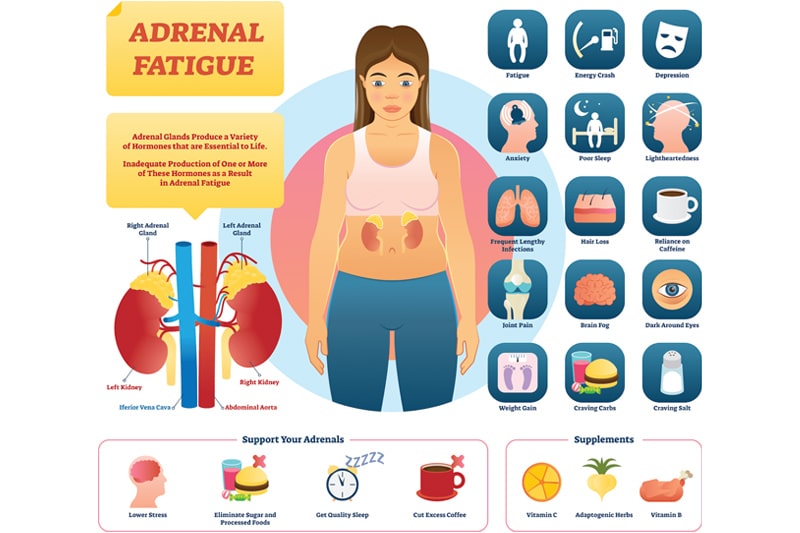Do you feel like you’re running on empty most of the time? Are you constantly tired, stressed out, and struggling to keep up with your daily routine? If so, you may be suffering from adrenal fatigue. This condition occurs when your adrenal glands, which are responsible for producing hormones that regulate your body’s stress response, become overworked and can no longer keep up with the demands placed on them.
In this comprehensive guide, we’ll explore the definition and causes of adrenal fatigue and provide you with tips and strategies for overcoming this debilitating condition.
What is Adrenal Fatigue?
Adrenal fatigue is a term used to describe a collection of symptoms that occur when your adrenal glands become overworked and can no longer keep up with the demands placed on them. These symptoms can include:
- Chronic fatigue
- Difficulty getting out of bed in the morning
- Brain fog
- Insomnia
- Weight gain
- Depression
- Anxiety
- Irritability
- Cravings for salty or sugary foods
- Low libido
- Muscle weakness
- Difficulty handling stress
- Low blood pressure
- Increased susceptibility to illness
If you’re experiencing one or more of these symptoms, it’s possible that you may be suffering from adrenal fatigue.
What Causes of Adrenal Fatigue?
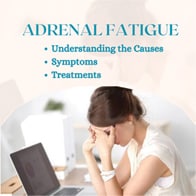
Adrenal fatigue is typically caused by prolonged or chronic stress. When you’re under stress, your adrenal glands release hormones like cortisol and adrenaline to help you cope with the demands placed on your body. However, if you’re constantly stressed out and your body is in a state of constant “fight or flight,” your adrenal glands can become overworked and can no longer keep up with the demands placed on them.
Other factors that can contribute to adrenal fatigue include:
Poor diet: Eating a diet high in sugar, caffeine, and processed foods can put additional stress on your adrenal glands.
Lack of sleep: Not getting enough sleep can interfere with your body’s ability to recover and repair, putting additional stress on your adrenal glands.
Chronic illness: Chronic illnesses like autoimmune diseases or chronic infections can put additional stress on your body and lead to adrenal fatigue.
Environmental toxins: Exposure to environmental toxins like pesticides, heavy metals, and mold can put additional stress on your body and lead to adrenal fatigue.
How to Overcome Adrenal Fatigue

If you’re suffering from adrenal fatigue, there are steps you can take to help overcome this condition and restore your energy levels. Here are some tips and strategies to consider:
Reduce Your Stress Levels: The most important step in overcoming adrenal fatigue is to reduce your stress levels. This may mean making changes to your lifestyle, such as practicing relaxation techniques like meditation or yoga, taking up a hobby, or spending time in nature.
Improve Your Diet: Eating a healthy, balanced diet can also help support your adrenal glands. Focus on eating whole, nutrient-dense foods like fruits, vegetables, lean protein, and healthy fats. Avoid sugary, processed foods, caffeine, and alcohol.
Get Enough Sleep: Getting enough sleep is crucial for allowing your body to rest and recover. Aim for 7-9 hours of sleep per night and establish a consistent sleep routine.
Exercise Regularly: Exercise can help reduce stress and improve your mood. However, it’s important to choose exercises that are gentle on your body and avoid overexerting yourself.
Symptoms of Adrenal Fatigue
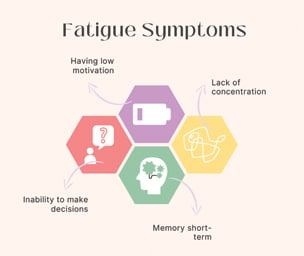
Chronic Fatigue and Low Energy
One of the most common symptoms of adrenal fatigue is a feeling of chronic fatigue and low energy. If you find yourself feeling tired all the time, even after getting a full night’s sleep, it may be a sign that your adrenal glands are not functioning properly.
Difficulty Sleeping
People with adrenal fatigue often have difficulty falling asleep or staying asleep. They may wake up frequently during the night or feel tired even after sleeping for several hours.
Brain Fog and Difficulty Concentrating
Adrenal fatigue can also affect cognitive function, leading to brain fog and difficulty concentrating. You may find it hard to focus on tasks or remember things that you would normally have no trouble with.
Mood Swings and Irritability
Another common symptom of adrenal fatigue is mood swings and irritability. You may find yourself feeling more emotional than usual and easily frustrated or annoyed by minor things.
Cravings for Salty or Sweet Foods
People with adrenal fatigue often experience cravings for salty or sweet foods. This is because the adrenal glands are responsible for regulating blood sugar levels, and when they are not functioning properly, it can lead to imbalances in blood sugar and cravings for certain types of foods.
Weight Gain
Adrenal fatigue can also lead to weight gain, especially around the midsection. This is because the adrenal glands produce cortisol, a hormone that is involved in the body’s response to stress. When cortisol levels are elevated for long periods of time, it can lead to increased fat storage in the abdominal area.
Low Libido
Adrenal fatigue can also affect your sex drive, leading to a decreased libido. This is because the adrenal glands produce hormones that are involved in sexual function, and when they are not functioning properly, it can lead to a decrease in libido.
Digestive Issues
People with adrenal fatigue may also experience digestive issues such as bloating, constipation, or diarrhea. This is because the adrenal glands are involved in the regulation of the digestive system, and when they are not functioning properly, it can lead to digestive problems.
Weakened Immune System
Adrenal fatigue can also weaken your immune system, making you more susceptible to infections and illnesses. This is because the adrenal glands produce hormones that are involved in the body’s immune response, and when they are not functioning properly, it can lead to a weakened immune system.
How Adrenal Fatigue Can Affect Your Health

Adrenal fatigue can affect your health in a variety of ways. Here are some of the most common ways that adrenal fatigue can impact your body:
Increased risk of infections
When your adrenal glands become overworked, your immune system may become compromised. This can increase your risk of infections, including colds, flu, and other illnesses.
Hormonal imbalances
The adrenal glands produce a variety of hormones, including cortisol, adrenaline, and DHEA. When these hormones are not produced in optimal levels, it can lead to hormonal imbalances that can cause a wide range of symptoms, including weight gain, mood swings, and low libido.
Digestive problems
Adrenal fatigue can also impact your digestive system, leading to symptoms like bloating, constipation, and diarrhea. This can be caused by the fact that the adrenal glands produce hormones that regulate digestion.
Skin problems
Adrenal fatigue can also lead to skin problems like acne, rashes, and dry skin. This is because the adrenal glands produce hormones that regulate oil production in the skin.
Mental health problems
Adrenal fatigue can also impact your mental health, leading to symptoms like anxiety, depression, and irritability. This is because the adrenal glands produce hormones that regulate mood and stress levels.
Weight gain
Adrenal fatigue can also contribute to weight gain, especially in the belly area. This is because the adrenal glands produce hormones that regulate metabolism and the storage of fat.
Low energy levels
One of the most common symptoms of adrenal fatigue is fatigue and low energy levels. This is because the adrenal glands produce hormones that regulate energy levels and the body’s response to stress.
How is Adrenal Fatigue Diagnosed?
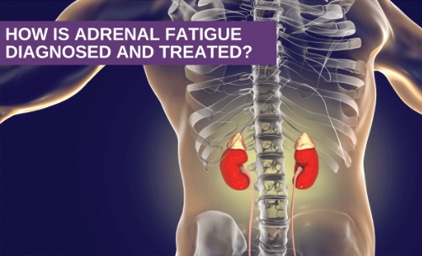
Adrenal fatigue is not a recognized medical condition, and there is no definitive test for diagnosing it. However, there are several tests that can help identify imbalances in hormone levels that are associated with adrenal fatigue. There are several tests that your healthcare provider may use to diagnose adrenal fatigue. Let’s take a closer look at each of these tests:
Salivary Cortisol Test
The salivary cortisol test is one of the most common tests used to diagnose adrenal fatigue. This test measures the amount of cortisol in your saliva at different times of the day. Cortisol is a hormone that is produced by the adrenal glands and is involved in the body’s stress response.
This test is usually done at four different times of the day: morning, noon, afternoon, and evening. The results of the test can help your healthcare provider determine if your cortisol levels are too high or too low.
Adrenal Stress Index (ASI)
The Adrenal Stress Index (ASI) is a comprehensive test that measures cortisol and other hormones that are involved in the body’s stress response. This test measures cortisol levels at different times of the day, as well as DHEA, which is another hormone produced by the adrenal glands.
In addition to measuring cortisol and DHEA, the ASI also measures other hormones, such as insulin and testosterone, that can affect the body’s stress response. This test can provide a comprehensive picture of your adrenal function and help your healthcare provider develop a personalized treatment plan.
ACTH Stimulation Test
The ACTH stimulation test is a test that measures how well your adrenal glands respond to ACTH, which is a hormone that is produced by the pituitary gland. This test involves injecting a small amount of ACTH into your body and then measuring your cortisol levels before and after the injection.
This test can help your healthcare provider determine if your adrenal glands are functioning properly and producing enough cortisol. It can also help diagnose other conditions, such as Addison’s disease, which is a condition where the adrenal glands don’t produce enough cortisol.
Thyroid Function Tests
The thyroid gland and the adrenal glands are closely linked, and thyroid dysfunction can often contribute to adrenal fatigue. Your healthcare provider may perform a series of thyroid function tests to determine if your thyroid is functioning properly.
If your thyroid is not functioning properly, it can affect the function of your adrenal glands and exacerbate symptoms of adrenal fatigue. Thyroid function tests may include measuring your TSH, T4, and T3 levels.
Blood Sugar Tests
Blood sugar levels can also play a role in adrenal fatigue. Your healthcare provider may perform a series of blood sugar tests to determine if your blood sugar levels are contributing to your symptoms.
If your blood sugar levels are too high or too low, it can affect the function of your adrenal glands and exacerbate symptoms of adrenal fatigue. Blood sugar tests may include measuring your fasting blood glucose levels and performing a glucose tolerance test.
Lifestyle Changes for Adrenal Fatigue

Improve Your Diet
One of the most important lifestyle changes you can make to manage adrenal fatigue is to improve your diet. A diet rich in whole, nutrient-dense foods can help support your adrenal glands and reduce inflammation throughout your body.
Here are some dietary changes you can make to support your adrenal glands:
- Eat a balanced diet of protein, healthy fats, and complex carbohydrates.
- Include plenty of leafy greens, colorful vegetables, and antioxidant-rich fruits in your diet.
- Avoid processed foods, refined sugar, and caffeine.
- Incorporate foods high in B vitamins, such as salmon, leafy greens, and whole grains.
Consider taking supplements like magnesium, vitamin C, and adaptogenic herbs like ashwagandha and rhodiola.
Get Enough Sleep

Sleep is crucial for your adrenal glands to recover and repair. If you’re not getting enough sleep, your adrenal glands will continue to be overworked and may even worsen your adrenal fatigue symptoms.
Here are some tips for getting better sleep:
- Stick to a regular sleep schedule, going to bed and waking up at the same time each day.
- Create a relaxing bedtime routine, such as taking a warm bath, reading a book, or practicing meditation or yoga.
- Make sure your sleeping environment is cool, dark, and quiet.
- Avoid electronics for at least an hour before bedtime.
Reduce Your Stress
Chronic stress is one of the main causes of adrenal fatigue, so it’s important to find ways to reduce your stress levels. While it’s impossible to eliminate stress from your life completely, there are many ways you can manage and reduce your stress levels.
Here are some stress-reducing techniques you can try:
- Practice deep breathing, meditation, or yoga.
- Exercise regularly to release endorphins and reduce stress hormones.
- Take breaks throughout the day to relax and recharge.
- Spend time in nature, such as going for a walk or hike.
Talk to a therapist or counselor if you’re experiencing chronic stress or anxiety.
Move Your Body
Exercise is essential for maintaining overall health and reducing stress levels. Regular exercise can also help improve adrenal fatigue symptoms, such as fatigue, mood swings, and muscle weakness.
Here are some tips for incorporating exercise into your daily routine:
- Start with gentle exercises, such as walking or yoga.
- Gradually increase your intensity and duration as your energy levels improve.
- Find an exercise buddy or join a class to stay motivated.
- Take breaks if you feel tired or overwhelmed.
Herbal Supplements and Vitamins for Adrenal Fatigue

Ashwagandha, also known as Withania somnifera, is an adaptogenic herb that has been used in Ayurvedic medicine for thousands of years to promote vitality and longevity. Ashwagandha can help reduce stress and anxiety, improve sleep quality, enhance brain function, and support immune function.
How to use: Take 300-500 mg of ashwagandha extract or powder daily, preferably in the morning or before bed.
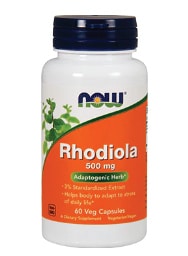
Rhodiola Rosea is a flowering herb that grows in cold regions of the world, including Siberia and Scandinavia. Rhodiola has been shown to improve mood, reduce fatigue, and enhance mental performance, making it an excellent choice for people with adrenal fatigue.
How to use: Take 200-600 mg of Rhodiola extract daily, preferably in the morning or before exercise.
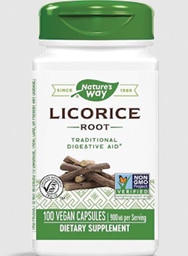
Licorice root, also known as Glycyrrhiza glabra, is a sweet-tasting herb that has been used in traditional medicine for thousands of years. Licorice can help support adrenal function, reduce inflammation, and improve digestive health.
How to use: Take 200-400 mg of licorice root extract daily, preferably in the morning or before meals.

Magnesium is an essential mineral that plays a vital role in many bodily functions, including energy production, muscle and nerve function, and blood sugar control. Magnesium deficiency is common in people with adrenal fatigue, and supplementing with magnesium can help reduce fatigue and improve sleep quality.
How to use: Take 200-400 mg of magnesium daily, preferably before bed.
Vitamin B Complex
B vitamins are essential for energy production, brain function, and nervous system health. Vitamin B12, in particular, is crucial for adrenal function and can help reduce fatigue and improve mood.
How to use: Take a high-quality B complex supplement that contains at least 50 mg of each B vitamin daily, preferably in the morning.
Natural Remedies for Adrenal Fatigue
There are many natural remedies that can help support your adrenal glands and reduce the symptoms of adrenal fatigue. Some of the most effective natural remedies for adrenal fatigue include:
Adaptogenic herbs: These herbs, such as ashwagandha, rhodiola, and ginseng, can help your body adapt to stress and reduce the negative effects of cortisol on your body. You can take these herbs in supplement form or as part of a herbal tea blend.
Vitamin C: This antioxidant can help reduce inflammation and support your immune system, which can be compromised in people with adrenal fatigue. You can take vitamin C supplements or eat foods high in vitamin C, such as oranges, bell peppers, and strawberries.
Magnesium: This mineral is essential for many body processes, including muscle and nerve function, energy production, and stress management. People with adrenal fatigue often have low levels of magnesium, so taking a supplement or eating foods rich in magnesium, such as spinach, almonds, and avocado, can help support adrenal function.
B-complex vitamins: These vitamins, such as B12 and folate, are important for energy production, mood regulation, and stress management. Taking a high-quality B-complex supplement can help reduce symptoms of adrenal fatigue.
Omega-3 fatty acids: These healthy fats can help reduce inflammation, support brain function, and improve mood. Eating foods rich in omega-3s, such as fatty fish, flaxseed, and chia seeds, or taking a supplement can help support adrenal function.
How to Prevent Adrenal Fatigue
Manage Stress
One of the most important steps you can take to prevent adrenal fatigue is to manage your stress levels. Chronic stress can cause your adrenal glands to become overworked, leading to adrenal fatigue. To manage your stress levels, try the following:
- Practice relaxation techniques such as deep breathing, meditation, or yoga
- Exercise regularly
- Get adequate sleep
- Prioritize self-care activities such as taking a bath, reading a book, or listening to music
- Seek support from friends or family members
Eat a Balanced Diet
Eating a balanced diet can help support healthy adrenal function. Try the following:
- Eat a diet rich in whole, unprocessed foods such as fruits, vegetables, whole grains, and lean proteins
- Avoid processed foods, sugary foods, and caffeine
- Eat small, frequent meals throughout the day to help maintain stable blood sugar levels
Supplement with Adaptogenic Herbs
Adaptogenic herbs are a group of herbs that can help support healthy adrenal function. Some adaptogenic herbs that may be helpful include:
- Ashwagandha
- Rhodiola
- Holy Basil
- Licorice Root
- Siberian Ginseng
It is important to speak with your healthcare provider before taking any supplements, especially if you are taking any medications.
Get Adequate Sleep
Getting adequate sleep is essential for healthy adrenal function. Aim for 7-9 hours of sleep each night and try the following to promote better sleep:
- Create a sleep-conducive environment by keeping your bedroom cool, dark, and quiet
- Avoid electronics and screens for at least 30 minutes before bedtime
- Stick to a consistent sleep schedule, even on weekends
Practice Good Sleep Hygiene
In addition to getting adequate sleep, practicing good sleep hygiene can help support healthy adrenal function. Try the following:
- Avoid caffeine and alcohol before bedtime
- Avoid large meals or heavy exercise before bedtime
- Establish a relaxing bedtime routine
By fueling your body with healthy, nutrient-dense foods, you can support your adrenal glands and prevent fatigue.
Conclusion
Adrenal fatigue can be a challenging condition to diagnose and treat, but with the right support and lifestyle changes, it is possible to manage symptoms and improve overall health. If you are experiencing symptoms of adrenal fatigue, talk to your healthcare provider to determine the best course of action for your individual needs. By understanding the causes, symptoms, and treatments of adrenal fatigue, you can take steps to support your adrenal glands and improve your overall health and well-being.
To schedule an in person on Tele-medicine appointment
please call our office at 1-212-794-8800 or email us at info@patientsmedical.com. We look forward to hearing from you
Our medical center in New York City.
Patients Medical PC
1148 Fifth Avenue, Suite 1B
New York, NY 10128
About Patients Medical

PatientsMedical.com is headed by Dr. Rashmi Gulati, MD who is a board-certified physician with over 20 years of integrative, functional and internal medicine experience.
Patients Medical is a holistic wellness center dedicated to helping its clients discover health and rediscover vitality. Their physicians combine the best of conventional and holistic medicine with state-of-the-art equipment to provide comprehensive care and treatment to their patients. They focus on the root causes of secondary medical conditions, integrating modern medicine, holistic practices, and natural supplements to fast-track healing and prevent disease. Every year, thousands of existing and new patients continue to visit the center, seeking an alternative medical approach to a variety of health issues.
In addition, Patients Medical provides access to over 15,000 affordable supplements on their affiliated website: www.MySupplements.Store


